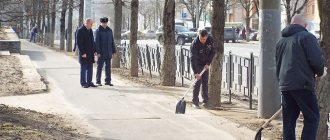For committing a socially dangerous crime, the person committed or suspected of it is placed in an isolation ward.
It is possible to isolate a person from society only in strict accordance with the law. A decision on deprivation of liberty or its temporary restriction can only be made by a judicial authority.
Once the suspect is detained, the case is taken to court. Even before the trial begins, investigative authorities begin to conduct an investigation. And the detainee is placed under guard in a temporary detention center (IVS).
- 1 General information 1.1 What is a temporary detention center in the police
- 1.2 Procedure for admission to the temporary detention facility
- 2.1 Raid on temporary detention center
General information
What is a temporary detention facility in the police?
The police temporary detention center for suspects and accused persons is intended for the detention of persons suspected and accused of committing a crime, as well as the temporary detention of persons for whom detention in custody has been chosen as a punishment, in cases provided for by the Criminal Procedure Code of the Russian Federation.
Individuals who are in custody at the pre-trial stage of the investigation are also placed in temporary detention facilities. Since in some cases the suspect must be taken to a place where there is no detention center.
This room can be located either in the police building or in a separate room.
On a note!
In the speech of law enforcement agencies, you can sometimes hear the abbreviation “KPZ”, which stands for “pre-trial detention cell,” previously called temporary detention facilities.
Citizens who have committed an administrative crime can receive up to 15 days of arrest, in accordance with the Code of Administrative Offenses of the Russian Federation. They are also placed in a temporary detention center, which has its own name - a special detention center.
Administrative offenders must be kept separately from suspected citizens for whom a decision has not yet been made. The issue of separate detention depends on the location of the detention centers and the capabilities of local departments of the Ministry of Internal Affairs.
Since detention centers are police departments, they are financed from the federal budget according to the estimate of the federal executive body, which carries out the functions of implementing state policy and legal regulation in the field of internal affairs.
The decision on creation, reorganization, liquidation is also made by the federal executive body.
Procedure for admission to the temporary detention center
Reception of suspects and accused persons is carried out around the clock by the operational duty officer of the temporary detention facility.
An employee of the Ministry of Internal Affairs checks identity documents. Conducts a survey and compares the data with the answers specified in the procedural document, which is the basis for detention.
Persons admitted are subject to a personal search, fingerprinting, photographing, and personal belongings are searched.
During the first day of stay in a temporary detention facility, admitted persons undergo a thorough medical examination in order to identify infectious diseases that pose a danger to others. And also for the presence of skin, venereal, and mental diseases. Sanitation is carried out to avoid head lice and scabies.
Separately located:
- Women and men;
- Adults and minors;
- Persons brought to criminal responsibility for the first time and previously in prison;
- Suspects and defendants involved in the same criminal case.
- Subjects suspected of committing a number of serious crimes concerning individual citizens or significant social values.
The procedure for placement in an isolation ward
The temporary detention center operates 24 hours a day, so detained citizens are received at any time of the day or night. The responsible duty officer for the territorial police unit and the temporary detention facility duty officer are responsible for the functioning of the detention center.
Please note! If a detainee is admitted to a temporary detention facility, the following is carried out:
- checking the documents available for the detained person;
- filling out the necessary documents for its maintenance, including a personal search protocol;
- interrogation of the detainee.
The main documents on the basis of which a detainee can be placed in a temporary detention facility are:
- arrest report drawn up by the investigator;
- arrest warrant.
Each person placed in a temporary detention facility must be examined for beatings and other bodily injuries. Upon inspection, a corresponding report is drawn up.
Attention! Our qualified lawyers will assist you free of charge and around the clock on any issues. Find out more here.
If bodily injuries are detected and a detainee complains, a medical professional must be called to see him. Based on the doctor's conclusion, the detainee may be placed in a hospital. Documents for the detention of a person are drawn up in two copies, one of which is handed over to the detainee.
In cases where women with children are taken to a temporary detention facility, the officer on duty is obliged to check the availability of documents that confirm the blood relationship between mother and child.
If the decision to detain such persons is made by the investigator, the head of the inquiry agency, the prosecutor or the court, then the documents drawn up by these persons are sufficient to admit the woman and children to the detention center.
Each person who is to be placed in isolation is searched and photographed. Fingerprinting is mandatory. On the first day of admission to the temporary detention facility, each detainee undergoes sanitary and hygienic treatment.
Important! To do this, an individual takes a shower or bath, and his clothing is disinfected. Each detainee must be provided with clean bed linen.
Details
Raid on temporary detention center
How are temporary holding cells equipped?
You shouldn’t count on comfortable conditions in the cell. The detention center is a small room with a capacity of up to 10 people. Quite often, isolation wards are overcrowded beyond normal.
- Individual beds, bunks;
- In separate cells for women with young children, there are children's beds;
- Table for eating;
- Benches according to the limit of seats in the cell;
- Wardrobe for storing things and food;
- Sanitary facilities with all necessary privacy standards;
- Washbasin with cold water;
- Clothes hanger;
- Radio speaker for broadcasting a national program;
- Duty call button;
- Exhaust ventilation.
All furniture is securely attached to the floor and has no removable parts.
In a special detention center for administrative punishment, there may be additional conditions. The cell also has beds and a table, a toilet and a washbasin.
During the heating season, heat is supplied to any IVS. Depending on the location, the isolator may have a window with bars. The cell door is always locked and there is a special window for serving food.
On a note!
Once a week, defendants are sanitized, showered, and bed linen changed.
Duration of detention in a temporary detention facility
In accordance with the law of the Code of Criminal Procedure of the Russian Federation, persons detained on suspicion of committing a crime are arrested for 48 hours. After this time, the suspect must be:
- Released;
- Arrested by the court and transferred to a pre-trial detention center;
- The period of detention was extended by the court to 72 hours;
- If it is necessary to conduct investigative experiments, the suspect can be detained in a temporary detention facility for up to 10 days.
If a citizen is serving a sentence in a special detention center for an administrative violation, then his term is determined by the court.
Important!
The time spent in a temporary detention facility cell immediately after arrest is counted toward serving the full sentence.
Inner order rules
Detainees may leave their cells only in the following cases:
- Daily walk. Which is carried out in a prepared area. The duration of the walk is 1 hour for an adult, 2 hours for a teenager. If the detainee wishes, the walk can be interrupted earlier.
- To meet with a lawyer. The detainee has the right to daily meetings, lasting up to 2 hours, with his lawyer.
- Meeting with relatives with the permission of the investigative authorities.
- For washing in a bath or shower, once a week.
- For inquiry, investigation, participation in investigative activities.
- For minors, teachers may be invited to teach.
The procedure for transferring personal belongings
The transfer of parcels from relatives is allowed in the temporary detention center. Please note that the total weight of the parcel should not exceed 30 kg.
The weight limit does not apply to the following categories of persons:
- Minors;
- Persons suffering from a serious illness confirmed by a medical certificate;
- Pregnant women or women serving time with a baby.
For teenagers, it is allowed to transfer textbooks and stationery to continue the educational process.
List of prohibited things:
- Piercing and cutting objects;
- Money;Prison
- Lighters;
- Medicines (without medical permission);
- Alcohol, drugs;
- Food products without factory labeling and packaging;
- Phones, sim cards.
All permissible nomenclature is publicly available in the temporary detention facility, where they are accepted, controlled, and weighed.
Important!
Transfers during a meeting with relatives or a lawyer are strictly prohibited.
The difference between a temporary detention facility and a pre-trial detention center
A pre-trial detention center is a 24-hour guarded pre-trial detention center. In which they place:
- Unconvicted citizens who are under investigation;
- Persons who have awaited a court decision and are awaiting further transportation to prison;
- Arrested persons awaiting transport to their homeland.
Pre-trial detention centers are cells that ensure the deprivation of liberty of suspected persons, but are not aimed at correcting the accused, but only to limit contact with others until the circumstances are clarified.
Permissible periods of detention
According to the requirements of criminal procedural legislation, the initial period for which a person can be placed in a temporary detention center cannot exceed 48 hours. This period is calculated from the time such a person is delivered to the employee who is conducting the investigation or conducting the inquiry.
In the future, one of the following possible decisions must be made:
- issue an investigator's order to arrest as a preventive measure with further transfer of the detainee to a pre-trial detention center;
- extend the period of detention to three full days, so that the total duration of detention in the temporary detention facility does not exceed 120 hours;
- release the detainee from the temporary detention facility.
Placement in a temporary detention facility: conditions
In terms of their conditions, the premises in temporary detention facilities resemble pretrial detention cells equipped with beds.
At the same time, one temporary detention facility cell cannot simultaneously contain:
- persons of different genders, that is, men and women;
- minors together with adults;
- persons who have committed a crime for the first time and have previously been convicted;
- persons detained as suspects and arrested;
- persons who are involved in the same criminal case;
- persons recognized as especially dangerous criminals;
- citizens of different nationalities and stateless;
- persons who previously worked in the system of the Ministry of Internal Affairs, the military department, the Prosecutor's Office, the judicial system, and persons not related to these structures;
- persons who use tobacco products and non-smokers.
Remember! When assigning individuals to cells, their moral and psychological characteristics are taken into account. Neglect of these rules may lead to conflicts with serious consequences.
To keep minors in temporary detention facilities, the premises must be equipped with cells with improved conditions:
- sanitary facilities;
- the presence of lamps;
- hood for access to fresh air;
- wardrobes for clothes and dishes;
- washing supplies;
- drinking water;
- and other necessary things.
In cells with improved living conditions, detainees and prisoners are given periodicals in the form of newspapers and magazines, various board games, necessary bath accessories, and a variety of cleaning equipment.
Watch the video. About working in a temporary detention center:
Inner order rules
The temporary detention center establishes a strict daily routine, which must be observed by all persons detained there.
It includes:
- a daily one-hour walk for adults and a two-hour walk for minors. Special courtyards are used for this;
- the possibility of meetings with a lawyer, the duration of which cannot exceed two hours a day;
- visits with family members and other relatives if the issue is resolved positively by the investigator, prosecutor or court. Their duration cannot exceed 3 hours twice a month;
- visiting a bathhouse or taking a shower once a week;
- removal from the cell for the duration of investigative actions;
- for minors of school age, training with teachers is provided if this is necessary;
- sending and receiving postal correspondence.
If the specified conditions of detention are not met, the detained or arrested person has the right to file a complaint.
Attention! Violation of the content rules is expressed in:
- insulting other persons who are in custody or detained;
- an attempt to attack a prison worker;
- receipt or storage of alcohol-containing products, narcotic drugs;
- receiving or storing other items prohibited for transfer;
- repeated violation of other conditions of detention.
The following measures of influence may be applied to those detained and arrested:
- placement in a punishment cell;
- deprivation of the right to correspondence;
- deprivation of the right to visit relatives;
- deprivation of board games and periodicals.









